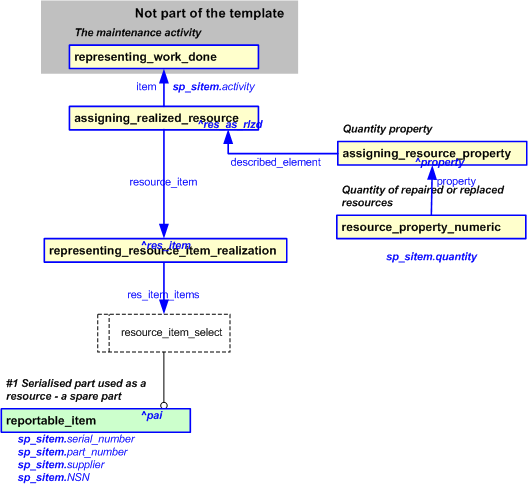Template:— consumed_spare_sitem (sp_sitem)
Context:— MoDAvDEX |
Date: 2008/01/29 11:23:33
Revision: 1.5
|
This section specifies the template consumed_spare_sitem.
NOTE
The template has been defined in the context of
MoDAvDEX.
Refer to the business context for details of related templates.
NOTE
An explanation of a template and the associated instantiation path is
provided in the
Template overview
section.
This template describes how to represent to represent spare parts used / fitted during a maintenance
activity where the part is identified by a serial number.
The EXPRESS-G diagram in
Figure
1
shows the templates and EXPRESS entities that are required
to represent the template
"consumed_spare_sitem".
The text highlighted in blue shows the template parameters.
Figure 1 — An EXPRESS-G representation of the Information model for consumed_spare_sitem
The graphic for the template to be used in other EXPRESS-G diagrams
is shown in Figure
2
below.
Figure 2 — The graphical representation of the consumed_spare_sitem template
The following input parameters are defined for this template:
Current Serial Number of the reportable item.
The Current Part Number of the reportable item indicating the design of this product individual.
The supplier of the reportable item.
NSN (Type='STRING', Optional)
Current NSN or code number of the reportable item.
The quantity of spare parts consumed.
The
Activity_actual
representing the work that was done that consumed this resource.
The following reference parameters are defined for this template:
Allow the
Product_as_individual
entity instantiated in this path to be referenced when this template is used.
%^target = $consumed_spare_sitem.pai%
Allow the
Resource_item
entity instantiated in this path to be referenced when this template is used.
Note: The
Resource_item
entity can be referenced in a template path by:
%^target = $consumed_spare_sitem.res_item%
where
target
is the parameter to which the
Resource_item
is bound.
%^target = $consumed_spare_sitem.res_as_rlzd%
Allow the
Resource_property
entity instantiated in this path to be referenced when this template is used.
%^target = $consumed_spare_sitem.property%
The instantiation path shown below specifies the entities that are to be
instantiated by the template.
A description of templates and the syntax for the instantiation path is
provided in the
Templates Help/Information section.
/
reportable_item(
serial_number=@serial_number,
part_number=@part_number,
supplier=@supplier,
NSN=@NSN)/
%^pai = $reportable_item.pai%
/
representing_resource_item_realization(
res_item_id='/NULL',
res_item_id_class='Resource_item_identification_code',
res_item_id_ecl_id='urn:plcs:rdl:std',
res_item_id_org_id='LITS',
res_item_id_org_id_class='Organization_name',
res_item_id_org_id_ecl_id='urn:plcs:rdl:std',
res_item_items=^pai)/
%^res_item = $representing_resource_item_realization.res_item%
/
assigning_realized_resource(
item=@activity,
resource_item=^res_item,
role_class_name='Resource_as_realized_employed_by',
role_ecl_id='urn:plcs:rdl:std')/
%^res_as_rlzd = $assigning_realized_resource.res_as_rlzd%
/
assigning_resource_property(
property_class_name='Count',
property_ecl_id='urn:plcs:rdl:std',
described_element=^res_as_rlzd)/
%^property = $assigning_resource_property.property%
/
resource_property_numeric(
value=@quantity,
unit='Count',
unit_ecl_id='urn:plcs:rdl:std',
si_unit='false',
context='Numerical_representation_context',
context_ecl_id='urn:plcs:rdl:std',
property=^property)/
Characterizations
No common characterizations of the template
consumed_spare_sitem
have been identified. However, the ISO 10303-239 EXPRESS model
may enable other assignments to the entities instantiated by the template.


